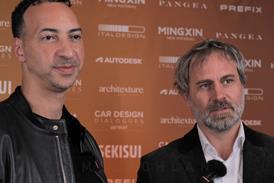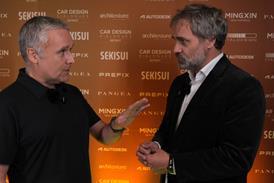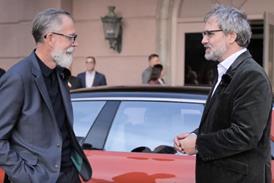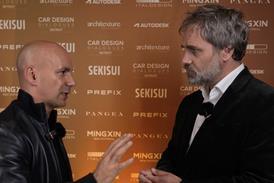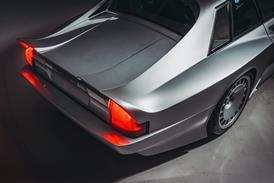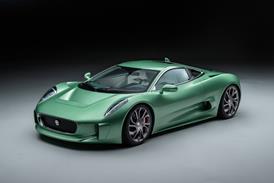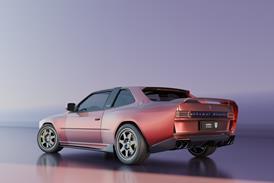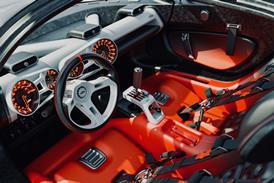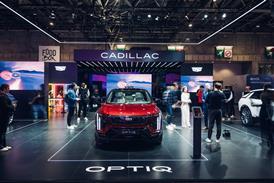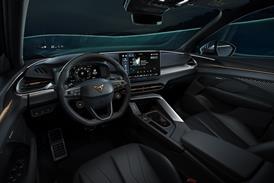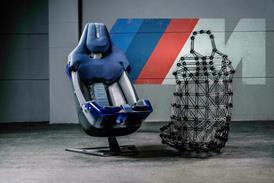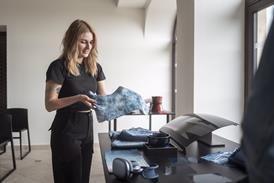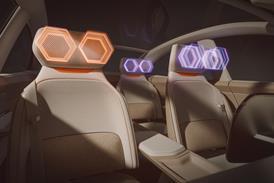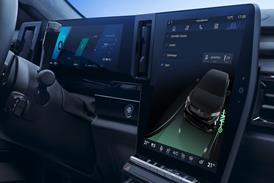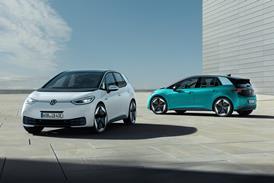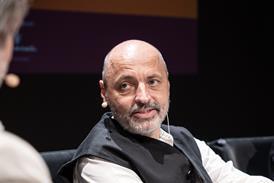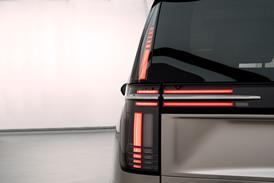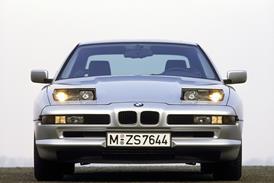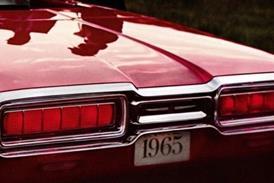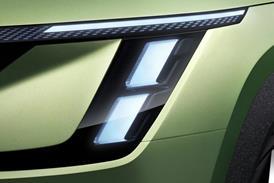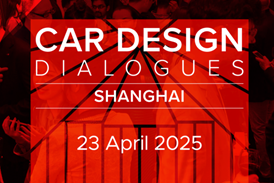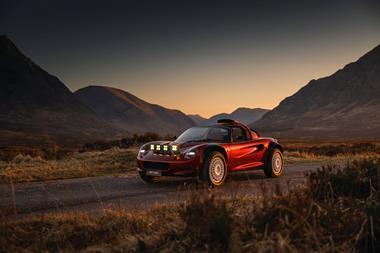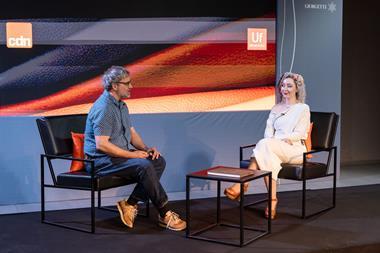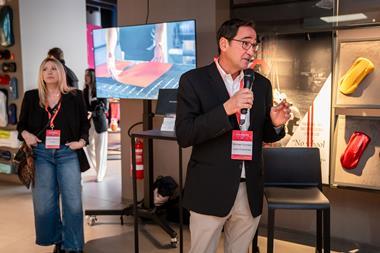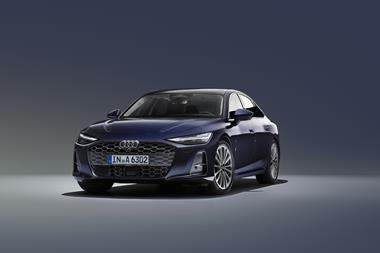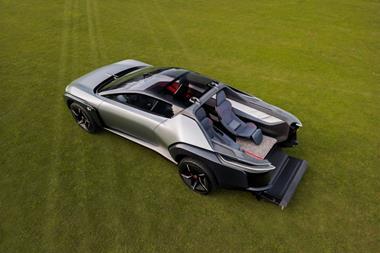IN THIS ISSUE

Chief designer NDE: Atsushi Maeda
Supplier Component
Paragon rear-view mirror
Synapse interior illumination
Lechler coatings white interior paint &
tinted lacquer for
acrylic/chrome parts
Mario Levi Magnetic Red leather
American Supply mesh seat insert
Wardle Storeys red PVC (IP/doors)
Eschmann Gravitex moulded rubber fl oor
“It’s very rare that a designer gets to work on something he’d buy himself,” says Qazana lead interior designer Paul Ray. Faced with a brief to attract a younger buyer, he turned inwards. “I looked at what I like to do: snowboarding, downhill mountain biking and surfi ng; light, structural, tough things. These things really came into the car through shapes and volumes” – as these inspiring objects prove. These attributes became the root of the project, grouped under the headline ‘Essence of Sports’, says NDE colour manager Marisol Manso Cortina.
 Vehicle type: production/four-door GT
Vehicle type: production/four-door GTDesign Director: Michael Mauer
Project started: Winter 2004
Project completed: Summer 2006
Launch: Shanghai 2009
Supplier Component
Eismann Group gear shifter
Burmester audio system
Porsche’s fourth model line – the four-door Panamera Gran Turismo – has been described by its top management as opening up a “brand new chapter” for the German company.
 Vehicle type: concept/3-door coupe
Vehicle type: concept/3-door coupeDesign Director: Patrick Lecharpy
Project completed: February 2009
Scale model built by: ProtoStyle
Launch: Geneva 2009
Inspiration for the interior came from architecture and open honeycomb waffle structures, together with modern furniture such as from Shangri La or Italian designer Ora Ito. These continuous surfaces are reminiscent of Mobius strip formations, and were combined with interlocking motifs based on squared circles give a robust, product design feel to the interior.
 Vehicle type: production/5-door hatchback
Vehicle type: production/5-door hatchbackInterior design manager: John Puskar
Lead interior designer: Beat Finkbeiner
Project started: Winter 2005
Project completed: 2007
Launch: Frankfurt 2009
The interior design team wanted to reinforce certain motifs through repetition. Thus the ‘U-shape-plus–wings graphic around the bottom of the steering wheel picked out in brightwork is echoed on the bottom of the centre stack around the gear shifter, and again in a more subtle way in the shape of the whole centre stack as it fl ares out into the IP and wraps around the doors, increasing the visual width of the interior.
Equally, some of the interior motifs mirror exterior ones, most notably the gooseneck-shaped interior door handle that echoes ‘in reverse’ the way the exterior rocker line rises up in front of the rear wheelarch before appearing to arc back and join the feature line running across the door panels.
 Vehicle type: concept/5-door MPV
Vehicle type: concept/5-door MPVDesign Director: Martin Smith
Chief interior designer: Ernst Reim
Lead designers: Robert Egan, Murat Seven
Colour & trim: Ruth Pauli
Project started: December 2007
Project completed: February 2009
Prototype built by: Carozzeria Coggiola
Launch: Geneva/March 2009
Supplier Component
SALT Gavina interior trim
Gravitex Eschmann IP/console grain
“For inspiration we looked in general at images of modernist architecture – Calatrava, Zaha Hadid and others; we looked at what is more moving in architecture… not very dogmatic, but rather what is moving in a kinetic way, displaying energy in motion. Other infl uences came from the sports industry, for example athletics: the materials, the fabrics they use. We also looked at elegant structures and minimalist design based around structures, for example paragliders or racing catamarans. Functional designs were the focus”.
 Vehicle type: concept/2-dr crossover coupe
Vehicle type: concept/2-dr crossover coupeDesign Director: Luciano D’Ambrosio
Lead Interior Desiger: Paolo Tesio
Project started: June 2008
Project completed: March 2009
Scale model built by: Vercarmodel
Launch: Shanghai 2009
Supplier Component
Mario Levi interior trim
Foglizzo seat trim
The brief from Changan’s management was to investigate a hybrid vehicle that would appeal to young people wishing to use their car both for professional and leisure activities. Hence the three-seat E301 crossover’s asymmetric rear layout – with an enclosed luggage tunnel in place of the fourth seat. Accessible by a barn-door style hatch and/or an exterior sliding shutter, the boot can transform into a pickup bed with an electrically extendable load fl oor to allow the car to carry a cycle or motorbike.
Vehicle type: production/large SUV
Design manager: Gerry McGovern
Lead interior designer: Martin Buffery
Project started: Autumn 2006
Project completed: Winter 2007
Launch: New York 2009
Supplier Component
JCI seats
Eagle Ottowa seat leather
Faurecia IP
Guildford headliner & seat
fabrics
Changes to the exterior of the Discovery 4 may have been relatively minor but the interior is an all-new affair and takes the model very much upmarket. Design director Gerry McGovern explains the reason for the dramatic shift: “At its launch the Discovery 3 won numerous design awards and I love its no-nonsense ‘form follows function’ approach, but it did polarise opinion. Indeed, some of the things that won it those awards were what its detractors didn’t like about it. They found it too brutalist.” Thus the new Discovery 4 interior has a less geometric and ‘upright’ feel, a more dynamically angled IP and centre stack, plus softer surfaces that include a stitched leathereffect, PU-wrapped IP top and slush-moulded centre stack surround.
 Vehicle type: concept/five-door hatchback
Vehicle type: concept/five-door hatchbackDesign director: Mike Warsaw
Lead interior designer: Danny Larsen
Project started: March 2008
Project completed: December 2008
Launch: NAIAS Detroit 2009
The re3’s interior is defi ned – and facilitated – by the car’s lithium ion hybrid powertrain, the batteries for which are stacked innovatively in the ‘transmission tunnel’ area between the front seats. With no storage opportunities there and no centre stack, JCI eked out every last drop of capacity in the IP with a huge passenger glovebox (almost a cubic foot). With the lid slid back, there’s “a shelving system in front of you”, says Warsaw, in which personal electronics can be connected and charged. The interior is focused around what Warsaw calls the ‘extended cluster’. This information display has a seamlessly integrated one-piece glass cover, but melds traditional dials with touchscreen tech. This allows functions to be ‘dragged and dropped’ from the main display to smaller screens inside the dials using a capacitive fi eld effect for the switching.
Magazine


